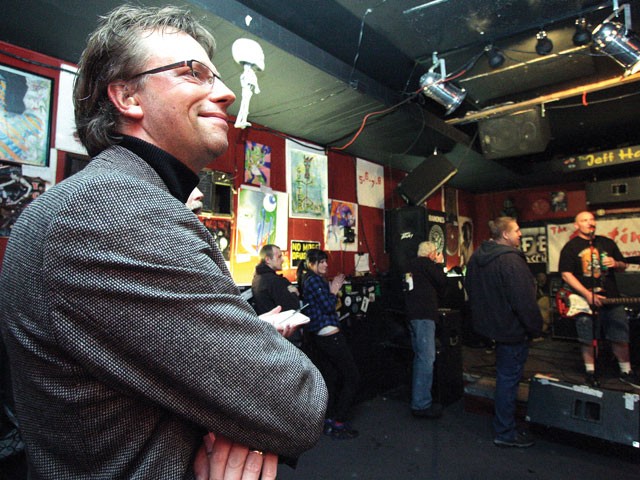Just outside Spokane’s best punk club, the Cretin Hop, four teenagers in hoodies are huddled against the late-night cold, clustered around a middle-aged guy with a notepad.
Just came from the symphony, I tell them — and I’ve invited Eckart Preu here tonight!
The conductor? Of the Spokane Symphony?
Suddenly, Eckart — in turtleneck and tailored sports jacket — is standing at my elbow. In a show of enthusiasm, I hear myself blurting out that “the second movement of the Tchaikovsky tonight was so luscious, so romantic — it was like good sex.”
Eckart’s eyes widen, but one of the punk kids jumps right in. “Dude, that’s exactly how I felt about Lobster Jaw,” he says. “Played here a couple of nights ago. F----- rad.”
We love the music that we and our friends choose to love. But disagreements about music’s nature split us into opposed camps: How prominent should the beat be? How complex? For dancing or for listening? Primarily for self-expression or for developing empathy? Angry or beautiful? Spontaneous or rehearsed?
Cretin Hop fans, I discovered, have a mantra about their music: Punk is for dancing, and it’s about chaos.
“There’s a lot of anger in this music, and these kids are lucky to get it out,” says Maurya Robinson. She’s clutching the videocam that she’ll soon use to record her husband’s performance. He’s a guitarist with We’re Watching, the last band on the bill tonight at the “Winter Zombie Mash.”
Eckart’s standing near a kid in skinny jeans with fake blood splattered over his forehead.
“There’s also a lot of socioeconomic angst,” Robinson says. “A lot of these kids, they’re young and impoverished. Their parents work at blue-collar jobs.”
The choruses of We’re Watching’s first three songs seem to bear out her observation: “Who’s getting murdered tonight? Everybody’s starving.” “Seems like you just don’t give a shit.” “You got what you paid for — no God, no faith, no redemption.”
Eckart is standing in the middle of the dance floor, arms crossed. Sometimes, ever so slightly, he winces. We remove our ear plugs so we can talk. “Anger and frustration are not the basis of music,” he says. “Music is about love. And sometimes, about destruction and tragedy. But not this.”
Later, outside, he summarized: “They were offbeat in ways that made my heart race and just drove me crazy,” he says. “I couldn’t discern any harmony. The whole point of having different instruments is to create different timbres and colors.” It bothered him that despite a full drum kit and the three guitarists’ pedals, it “all sounds the same. If I could just get that one guy to shout a little different than the other guy....” His voice trailed off.
Like a visual artist confronted with clashing colors or a chef encountering an intolerable mixture of ingredients, Eckart had had an unpleasant visceral reaction against music that struck him, at any rate, as discordant and just wrong.
The punk fans I met the next day looked discordant among the upscale Fox crowd. When I invited them, they had immediately asked what they were supposed to wear. They came in wearing purple hair, dreadlocks and piercings.
Up in the balcony, Johnathan Darby (who goes by Johnnie) and Passion Snow bury themselves in their programs. Johnnie keeps repeating one of the composers’ names in a low voice: “Rachmaninoff, Rock-mahn-uh-noff. Reminds me of “Rock Me Amadeus,” he says. “You have to be old to remember that” says Johnnie, who’s 23, to Passion, who’s 19.
The lights go down. “Shhh, you have to be quiet,” Johnnie admonishes.
At intermission, Darby admitted that he was “afraid I would be judged by rich people.” But he didn’t feel judged, he said, and a couple of matrons even engaged my punk companions in polite conversation.
Passion and Johnnie both focused on the visuals at the concert: the mics suspended from the Fox’s ceiling; that long, long grand piano; violinists who require not one but two pillows on their chairs; the way soloist Valentina Lisitsa smiled and hummed to herself as her hands wafted above the piano keys; and her shoes, which must be hard to play in “with those sparkly things on the straps.”
Johnnie’s post-performance reaction? “It wasn’t as loud as I expected. If it was louder, I wouldn’t complain about that. At the Cretin Hop, I can feel it better. I can feel it all through my body, and it gets louder, and my heart gets going so fast that I think it’s gonna explode.”
Or, as a goth girl at the Cretin Hop had put it, “The music here is meant to dance to. Otherwise, it’s no f----- good. The point isn’t just to listen.”
In a Feb. 27 article in The American, “Soul Music,” Roger Scruton observes that of course there is plenty of popular music today that people enjoy dancing to, alongside others. “Yet there is growing, within popular music, another kind of practice altogether,” Scruton says, “one in which the movement is no longer contained in the musical line but exported to a place outside it, to a center of pulsation which demands not that you listen but that you submit. If you do submit, the moral qualities of the music vanish behind the excitement.”
All of us, of course, tap our feet to music that we like. But with music that is amplifier- and backbeat-heavy, Scruton says, “External movement is shoved at us. You cannot easily move with it, but you can submit to it. When music organized by this kind of external movement is played at a dance, it automatically atomises the people on the dance floor. They may dance at each other, but only painfully with each other.”
Listen with; dance at.
The classical crowd has isolated itself through its snobbery and by intellectualizing the emotional experience of listening to music; punk rock fans, by prioritizing relentless rhythm and violent self-expression, have similarly cut themselves off from other people. Both niches are self-limiting.
The blue-haired ladies would do well to recognize that those less fortunate than themselves are hurting and dejected, and the body-slamming, high-decibel crowd would do well to recognize that even in a crap world, melodies and harmonies and beauty are not only still possible, but a route to understanding folks outside their own circle.
Lobster Jaw next plays at the Cretin Hop, 1317 N. Howard St., along with five other punk bands, on Friday, March 26, at 6 pm. Tickets: $5. Visit myspace.com/thecretinhop or call 368-4077 or 327-7195.
The Spokane Symphony Orchestra’s next Classics concert will present music of Bizet, Saint-Saens and Dvorak at the Fox, 1001 W. Sprague, on Friday, March 20, at 8 pm and on Saturday, March 21, at 3 pm. Tickets: $22-$44. Visit spokanesymphony.org or call 624-1200 or (800) 325-SEAT.
Correction: This story originally referred
to Johnathan Darby using feminine pronouns. Darby is male. We
regret the mistaken references.

















